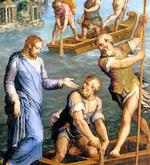Catechism of the Catholic Church
1130 The Church celebrates the mystery of her Lord "until he comes," when God will be "everything to everyone." 53 Since the apostolic age the liturgy has been drawn toward its goal by the Spirit's groaning in the Church: Marana tha! 54 The liturgy thus shares in Jesus' desire: "I have earnestly desired to eat this Passover with you . . . until it is fulfilled in the kingdom of God." 55 In the sacraments of Christ the Church already receives the guarantee of her inheritance and even now shares in everlasting life, while "awaiting our blessed hope, the appearing of the glory of our great God and Savior Christ Jesus." 56 The "Spirit and the Bride say, 'Come . . . Come, Lord Jesus!"' 57
St. Thomas sums up the various aspects of sacramental signs: "Therefore a sacrament is a sign that commemorates what precedes it- Christ's Passion; demonstrates what is accomplished in us through Christ's Passion - grace; and prefigures what that Passion pledges to us - future glory." 58
IN BRIEF:
1131 The sacraments are efficacious signs of grace, instituted by Christ and entrusted to the Church, by which divine life is dispensed to us. The visible rites by which the sacraments are celebrated signify and make present the graces proper to each sacrament. They bear fruit in those who receive them with the required dispositions.
1132 The Church celebrates the sacraments as a priestly community structured by the baptismal priesthood and the priesthood of ordained ministers.
1133 The Holy Spirit prepares the faithful for the sacraments by the Word of God and the faith which welcomes that word in well-disposed hearts. Thus the sacraments strengthen faith and express it.
1134 The fruit of sacramental life is both personal and ecclesial. For every one of the faithful an the one hand, this fruit is life for God in Christ Jesus; for the Church, on the other, it is an increase in charity and in her mission of witness.
NOTES:
3 Eph 1:3-6.
4 eu-logia, bene-dictio.
5 Lk 10:21.
6 2 Cor 9:15.
7 Eph 1:6.
8 Rom 6:10; Heb 7:27; 9:12; cf. Jn 13:1; 17:1.
9 SC 6.
10 Cf. Jn 20:21-23.
11 SC 7; Mt 18:20.
12 SC 7.
13 SC 8; cf. LG 50.
14 LG 2.
15 Cf. DV 14-16; Lk 24:13-49.
16 Cf. 2 Cor 3:14-16.
17 Cf. I Pet 3:21.
18 Jn 6:32; cf. I Cor 10:1-6.
19 Cf. Jn 14:26.
20 SC 24.
21 PO 4.
22 DV 2.
23 Cf. Rom 12:1.
24 St. John Damascene, De fide orth 4, 13: PG 94, 1145A.
25 Cf. Eph 1:14; 2 Cor 1:22.
26 Cf. Jn 15:1-17; Gal 5:22.
27 Cf. I Jn 1:3-7.
28 2 Cor 13:13.
29 Cf. SC 6.
30 Cf. Council of Lyons II (1274) DS 860; Council of Florence (1439) DS 1310; Council of Trent (1547): DS 1601.
31 Council of Trent (1547): DS 1600-1601.
32 St. Leo the Great Sermo. 74, 2: PL 54, 398.
33 Cf. Lk 5:17; 6:19; 8:46.
34 Jn 16:13; cf. Mt 13:52; I Cor 4:1.
35 St. Augustine, De civ. Dei, 22, 17: PL 41, 779; cf. St. Thomas Aquinas, STh III, 64,2 ad 3.
36 LG 11; cf. Pius XII, Mystici Corporis (1943).
37 LG 11 § 2.
38 Cf. LG 10 § 2.
39 Cf. Jn 20:21-23; Lk 24:47; Mt 28:18-20.
40 Cf. Council of Trent (1547): DS 1609.
41 Lk 24:47.
42 Mt 28:19.
43 PO 4 §§ 1, 2.
44 SC 59.
45 Ep. 8.
46 Cf. DV 8.
47 Cf. UR 2; 15.
48 Cf. Council of Trent (1547): DS 1605; DS 1606.
49 Cf. Council of Trent (1547): DS 1608.
50 St. Thomas Aquinas, STh III, 68, 8.
51 Cf. Council of Trent (1547): DS 1604.
52 Cf. 2 Pet 1:4.
53 I Cor 11:26; 15:28.
54 I Cor 16:22.
55 Lk 22:15.
56 Titus 2:13.
57 Rev 22:17, 20.
58 St. Thomas Aquinas, STh III, 60, 3.
Notes:
English Translation of the Cathechism of the Catholic Church for the United States of America © 1997, United States Catholic Conference, Inc.






